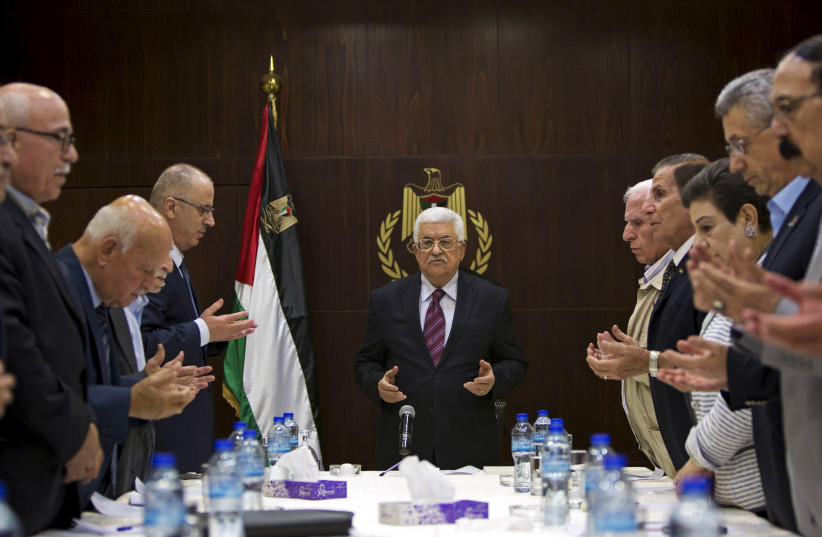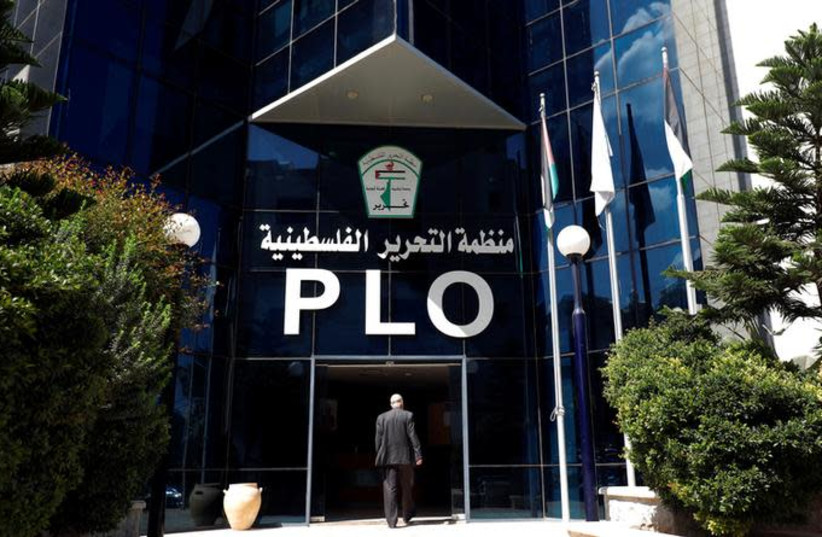by Khaled Abu Toameh
The meeting was postponed because Palestinian Authority President Mahmoud Abbas wants to maintain channels of communication with the Israeli government.
 |
Palestinian President Mahmoud Abbas (C), joins a reading of the
Koran prior to a meeting of the Palestinian Liberation Organization
(PLO) executive committee in the West Bank city of Ramallah, August 22,
2015.
(photo credit: MAJDI MOHAMMED/POOL VIA REUTERS)
|
A crucial meeting of the Palestinian Central Council that was
supposed to take place later this week has been delayed due to ongoing
tensions and differences among Palestinian officials and factions, Palestinian sources said on Saturday.
The
meeting was postponed because Palestinian Authority President Mahmoud
Abbas wants to maintain channels of communication with the Israeli
government, especially in light of his recent “positive” meeting with
Defense Minister Benny Gantz, the sources said.
In
its last meeting in 2018, the PCC recommended ending the security
coordination between PA security forces and the IDF and suspending the
PLO’s recognition of Israel until it recognizes a Palestinian state.
“President
Abbas is keen on preserving the dialogue with some members of the
Israeli government,” according to the sources. “He is also opposed to
calls by various Palestinian factions to terminate security coordination
with Israel.”
A
PLO official in Ramallah said the decision to delay the PCC meeting aims
“to avoid a confrontation” with both the Israeli government and the US
administration. The official said many of the Palestinian factions that
were supposed to attend the meeting were planning to renew their call
for cutting all ties with Israel.
 A
man enters the headquarters of the Palestinian Liberation Organization
(PLO), in Ramallah September 10, 2018 (credit: MOHAMAD TOROKMAN/REUTERS)
A
man enters the headquarters of the Palestinian Liberation Organization
(PLO), in Ramallah September 10, 2018 (credit: MOHAMAD TOROKMAN/REUTERS)The
PCC, also known as the PLO Central Council, is one of the Palestinians’
key decision-making institutions. Its 124 members belong to various
Palestinian factions, including those opposed to any peace process with
the Jewish state.
Earlier
this month, Abbas warned that Israel was continuing to undermine the
two-state solution and said that the PCC would hold a meeting soon to
“take decisive decisions” regarding the Israeli-Palestinian conflict.
He
was apparently referring to previous threats by the PA leadership to
suspend all relations with Israel in protest of the Israeli government’s
policies and measures toward the Palestinians.
In
a virtual address to the United Nations General Assembly last 2021,
Abbas gave Israel one year to “withdraw from the Palestinian territory
it occupied in 1967, including east Jerusalem.” If this is not achieved,
he warned, the Palestinians would no longer recognize Israel “based on
the 1967 borders.”
The
council was supposed to convene on January 20 to “discuss the issues of
interest to the Palestinians and to confront the fierce colonial
aggression facing the Palestinian issue,” said Salim Zanoun, speaker of
the Palestinian National Council (PNC), the Palestinian parliament in
exile.“It will also discuss
internal Palestinian issues in order to face the challenges, mainly the
Israeli settlement projects in the Palestinian territories, particularly
Jerusalem, and take the necessary decisions to confront the grave
challenges our people have to face to gain their full rights in ending
the occupation,” he said.
HOWEVER, PLO Executive Committee member Wasel Abu Yusef announced last week that the meeting has been delayed until further notice due to Abbas’s engagements abroad.
The
sources said the decision to delay the meeting was also taken after
several radical Palestinian factions turned down an invitation to attend
the parley. The invitation was delivered to the factions by Fatah
Secretary-General Jibril Rajoub during his recent visit to Syria.
The
faction heads told Rajoub that previous decisions taken by the PCC have
not been implemented by the Palestinian leadership. They also cited
Abbas’s decision to call off the parliamentary and presidential
elections, which were supposed to take place last year, as another
reason for their decision not to attend the meeting.
According
to the sources, sharp differences among senior Palestinian officials
over filling vacant positions in the PLO also prompted the PA leadership
to postpone the meeting.
One
of the disputes centers on filling the position of PLO
secretary-general, a job held by Saeb Erekat until his death in November
2020, the sources said.
Another dispute is related to finding a replacement for Hanan Ashrawi, who announced her resignation from the PLO Executive Committee in December 2020.
At least five senior Fatah officials are vying for the job of PLO secretary-general: Hussein al-Sheikh, Mohammed Shtayyeh, Jibril Rajoub, Mahmoud al-Aloul and Tawfik Tirawi.
But
Abu Yusef, the PLO Executive Committee member, said the PCC meeting was
supposed to “devise a strategy to confront the occupation, and not to
fill vacant positions.”
Maher
al-Taher, a senior official with the PLO’s Popular Front for the
Liberation of Palestine, said the crisis in the Palestinian arena was
“deeper than a meeting of the Palestinian Central Council.” He accused
the PA of “marginalizing” the PLO and turning it into a “structure
without content.”
The PFLP official called for reaching a “new political path and political vision” by rescinding the Oslo Accords with Israel.
Meanwhile,
six Palestinian factions have accepted an invitation from Algerian
President Abdelmajid Tebboune to attend a “dialogue conference” in the
Algerian capital later this week. The conference aims to end the dispute
between Fatah and Hamas and achieve “national reconciliation.”
Hamas
has accepted the invitation, saying it will send two of its senior
officials, Khalil al-Hayya and Husam Badran. Previous attempts by Saudi
Arabia, Yemen, Egypt and Qatar to end the Fatah-Hamas rivalry have
failed, although the two sides signed a number of reconciliation
agreements that were never implemented.
Khaled Abu Toameh
Source: https://www.jpost.com/middle-east/article-692604
No comments:
Post a Comment